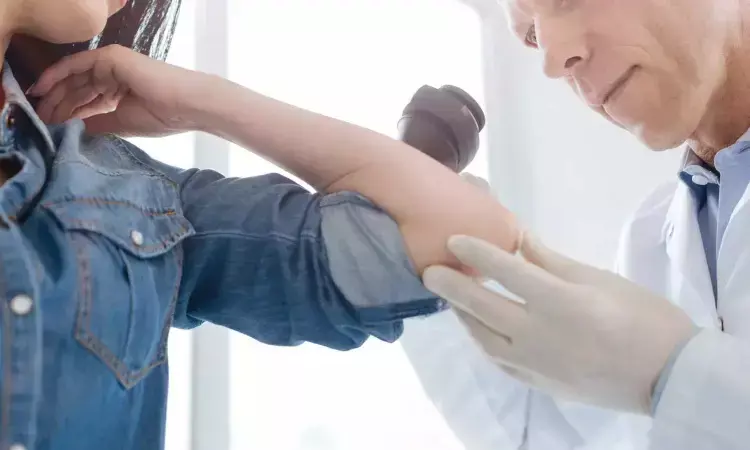- Home
- Medical news & Guidelines
- Anesthesiology
- Cardiology and CTVS
- Critical Care
- Dentistry
- Dermatology
- Diabetes and Endocrinology
- ENT
- Gastroenterology
- Medicine
- Nephrology
- Neurology
- Obstretics-Gynaecology
- Oncology
- Ophthalmology
- Orthopaedics
- Pediatrics-Neonatology
- Psychiatry
- Pulmonology
- Radiology
- Surgery
- Urology
- Laboratory Medicine
- Diet
- Nursing
- Paramedical
- Physiotherapy
- Health news
- Fact Check
- Bone Health Fact Check
- Brain Health Fact Check
- Cancer Related Fact Check
- Child Care Fact Check
- Dental and oral health fact check
- Diabetes and metabolic health fact check
- Diet and Nutrition Fact Check
- Eye and ENT Care Fact Check
- Fitness fact check
- Gut health fact check
- Heart health fact check
- Kidney health fact check
- Medical education fact check
- Men's health fact check
- Respiratory fact check
- Skin and hair care fact check
- Vaccine and Immunization fact check
- Women's health fact check
- AYUSH
- State News
- Andaman and Nicobar Islands
- Andhra Pradesh
- Arunachal Pradesh
- Assam
- Bihar
- Chandigarh
- Chattisgarh
- Dadra and Nagar Haveli
- Daman and Diu
- Delhi
- Goa
- Gujarat
- Haryana
- Himachal Pradesh
- Jammu & Kashmir
- Jharkhand
- Karnataka
- Kerala
- Ladakh
- Lakshadweep
- Madhya Pradesh
- Maharashtra
- Manipur
- Meghalaya
- Mizoram
- Nagaland
- Odisha
- Puducherry
- Punjab
- Rajasthan
- Sikkim
- Tamil Nadu
- Telangana
- Tripura
- Uttar Pradesh
- Uttrakhand
- West Bengal
- Medical Education
- Industry
Insulin metabolism disorders may be associated with etio-pathology of skin tags

Insulin metabolism disorders may be associated with etio-pathology of skin tags suggests a new study published in the BMC Dermatology
There are reports that acrochordon (skin tag), the most common fibroepithelial tumor of the skin, may be associated with metabolic syndrome components, particularly insulin metabolism disorders. However, to the best of our knowledge, there is no study examining its association with insulin resistance and tissue levels of insulin-like growth factor 1 receptor (IGF-1R) and insulin-like growth factor 2 receptor (IGF-2R).
Thirty patients with at least one acrochordon in their body who had no known history of diabetes mellitus and a control group comprised 30 individuals who had no acrochordon or no known history of diabetes mellitus were included. The tissue expression of IGF-1R and IGF-2R were investigated via immunohistochemical assessment in both groups.
Results
In the group with acrochordon, IGF-1R and IGF-2R expression was found to be significantly higher compared to the control group (p < 0,01). Using logistic regression analysis, an increase in serum insulin, serum IGF-1 and HOMA-IR levels was found to be associated with the expression levels of IGF-1R and IGF-2R.
These findings support the view that insulin metabolism disorders should be evaluated in patients with acrochordon. The study indicates that IGF receptors may have an effect on acrochordon pathogenesis and that acrochordon etiology and related conditions can be clarified by detection of parameters that influence receptor levels.
The results of the study have suggested that IGF–1R and IGF–2R may play role in the pathogenesis of acrochordon. We found that IGF receptor levels are correlated with BMI, serum insulin and IGF–1 levels in patients with acrochordon. When taken together, our results suggest that hyperinsulinemia and insulin resistance play a role in the development of acrochordon at tissue receptor level, and could be mediated by IGF–1.
Reference:
Köseoğlu, H.G., Bozca, B.C., Başsorgun, C.İ. et al. The role of insulin-like growth factor in Acrochordon Etiopathology. BMC Dermatol 20, 14 (2020). https://doi.org/10.1186/s12895-020-00111-0
Dr. Shravani Dali has completed her BDS from Pravara institute of medical sciences, loni. Following which she extensively worked in the healthcare sector for 2+ years. She has been actively involved in writing blogs in field of health and wellness. Currently she is pursuing her Masters of public health-health administration from Tata institute of social sciences. She can be contacted at editorial@medicaldialogues.in.
Dr Kamal Kant Kohli-MBBS, DTCD- a chest specialist with more than 30 years of practice and a flair for writing clinical articles, Dr Kamal Kant Kohli joined Medical Dialogues as a Chief Editor of Medical News. Besides writing articles, as an editor, he proofreads and verifies all the medical content published on Medical Dialogues including those coming from journals, studies,medical conferences,guidelines etc. Email: drkohli@medicaldialogues.in. Contact no. 011-43720751


